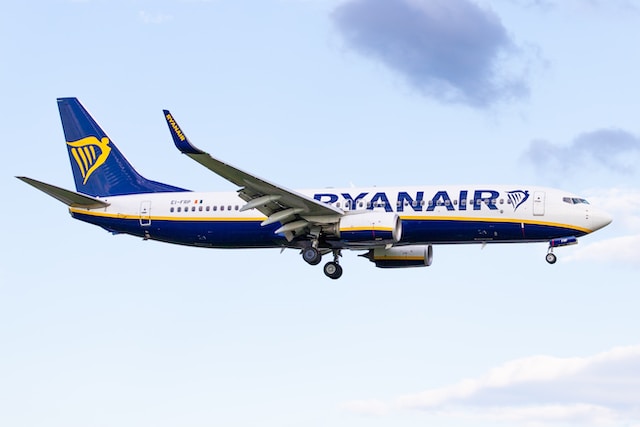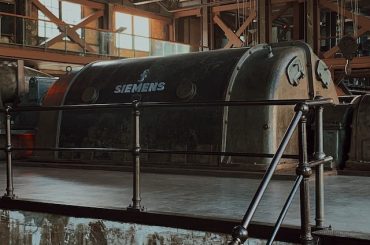Before we dive deep into the PESTEL analysis, let us get the business overview of Ryanair. Ryanair is an Irish low-cost airline founded in 1984 by Christopher Ryan, Liam Lonergan, and Tony Ryan.
The company is headquartered in Swords, Dublin, Ireland, and its primary operational bases are located at Dublin and London Stansted airports. Ryanair has grown to become Europe’s largest low-cost carrier and one of the largest airlines in the world by passenger numbers.
Business Model: Ryanair’s business model revolves around offering low fares to stimulate demand while keeping costs down. This is achieved by operating a single aircraft type (Boeing 737), efficient fuel management, high aircraft utilization, and short turnaround times. The company also generates additional revenue from ancillary services such as baggage fees, seat selection, priority boarding, and in-flight sales.
Market Position: Ryanair dominates the European low-cost airline market, competing with other major low-cost carriers such as EasyJet, Wizz Air, and Vueling. It operates over 1,800 daily flights across 40+ countries, focusing on point-to-point flights between secondary airports, which typically have lower fees than major hubs.
Financial Performance: Ryanair has maintained a solid financial performance over the years, with consistent profitability and strong cash flow generation. Ryanair Holdings reported a strong half-year after-tax profit of €1.37bn, at a revenue of $6.6 billion.
Here is the PESTEL analysis of Ryanair
A PESTEL analysis is a strategic management framework used to examine the external macro-environmental factors that can impact an organization or industry. The acronym PESTEL stands for:
- Political factors: Relate to government policies, regulations, political stability, and other political forces that may impact the business environment.
- Economic factors: Deal with economic conditions and trends affecting an organization’s operations, profitability, and growth.
- Sociocultural factors: Relate to social and cultural aspects that may influence consumer preferences, lifestyles, demographics, and market trends.
- Technological factors: Deal with developing and applying new technologies, innovations, and trends that can impact an industry or organization.
- Environmental factors: Relate to ecological and environmental concerns that may affect an organization’s operations and decision-making.
- Legal factors: Refer to the laws and regulations that govern businesses and industries.
In this article, we will do a PESTEL Analysis of Ryanair.
PESTEL Analysis Framework: Explained with Examples
Political
- Government Stability: Ryanair, a Europe-based carrier, operates in various countries. The stability of governments in these nations can influence their operations, regulatory environment, and passenger confidence. Political instability can lead to disruptions in operations or reduced passenger demand.
- Bilateral Air Service Agreements: International operations rely on agreements between countries, allowing carriers from one nation to operate in another. Changes, cancellations, or renegotiations of these agreements can affect Ryanair’s routes and expansion strategies.
- Regulation and Aviation Policy: Governments have a significant say in aviation regulations, including safety standards, operational requirements, and customer service mandates. For instance, the EU’s regulations on compensation for delayed and canceled flights have a direct cost implication for Ryanair.
- Airport Access and Charges: Political decisions regarding the development and expansion of airports, as well as landing fees and other charges, can affect Ryanair’s cost structure and its choice of hubs.
- Taxation Policies: Governments’ decisions regarding aviation fuel taxes, sales taxes on tickets, or other relevant levies can impact ticket pricing and overall operational costs for Ryanair.
- Brexit: Given that Ryanair has significant operations connecting the UK with other European destinations, the political dynamics and decisions around Brexit had implications for the airline. This includes potential regulation changes, open skies agreements, and workforce considerations.
- Geopolitical Tensions: Ryanair operates in a largely peaceful continent, but geopolitical tensions, such as disputes between EU nations and non-EU nations, can influence flight routes, demand, and regulatory challenges.
- Government Support to National Carriers: Some countries might support their flag carriers or national airlines, which can create an uneven playing field. Subsidies, preferential treatment, or protectionist measures can put Ryanair at a disadvantage in specific markets.
Economic
- Economic Growth: The overall economic health of the countries Ryanair operates in can affect consumer spending power. A growing economy usually translates to increased business and leisure travel, benefiting airlines.
- Exchange Rates: Ryanair operates across multiple countries, which means it deals with various currencies. Fluctuations in exchange rates can influence ticket pricing, costs, and revenue when converted back to Ryanair’s reporting currency.
- Fuel Prices: One of the significant costs for airlines is aviation fuel. Economic factors affecting oil prices, such as supply and demand dynamics or geopolitical events, directly impact Ryanair’s operational costs.
- Inflation Rates: Inflation can increase operational costs, from wages to aircraft maintenance. High inflation can also affect consumer purchasing power, potentially reducing demand for air travel.
- Interest Rates: Like many airlines, Ryanair might rely on borrowed capital for operations or expansion. Interest rate fluctuations can impact financing costs. Additionally, high-interest rates can reduce discretionary spending by consumers, affecting demand.
- Unemployment Rates: High unemployment can lead to reduced disposable income, reducing demand for leisure and business travel. Conversely, a booming job market might increase business and leisure trips.
- Competition and Price Wars: The broader economic climate can influence the airline industry’s competition level. In more challenging economic times, airlines might engage in price wars to attract passengers, eroding profitability.
- Tourism Trends: Economic factors that influence tourism, like changing income levels or shifts in the value proposition of certain destinations, can impact Ryanair’s route profitability.
Sociocultural
- Travel Preferences: Different cultures and societies have varied vacation and travel preferences. Understanding these can help Ryanair tailor its services and routes to better suit its clientele.
- Demographics: Changes in population structures, such as age or family size, can influence travel patterns. For example, an aging population might prioritize different destinations or services compared to younger generations.
- Lifestyle Changes: As work-life balance becomes more important in European societies, short weekend getaways might become more prevalent. As a low-cost airline, Ryanair stands to benefit from such trends.
- Attitudes Towards Budget Travel: The acceptance and prevalence of budget travel in European societies have increased over the years. Ryanair, as a low-cost carrier, taps into this trend. However, societal values shifting towards premium services could pose challenges.
- Environmental Awareness: As people become more environmentally conscious, there’s increased scrutiny of industries that contribute to environmental degradation, like aviation. Ryanair might need to address these concerns through sustainable practices or face potential backlash.
- Cultural Perceptions of Service: The cultural expectations regarding customer service can differ across countries. For Ryanair, understanding these nuances is essential to ensure customer satisfaction.
- Health and Well-being Concerns: Events like the COVID-19 pandemic have drastically influenced societal attitudes toward travel, with health and safety becoming paramount. Like other airlines, Ryanair has had to adapt to these shifts in societal attitudes.
Technological
- Online Booking Systems: With the rise of internet usage, online booking platforms have become the norm. Ryanair has heavily leveraged this, offering exclusive discounts and promotions on its website, thereby bypassing traditional travel agents.
- In-flight Wi-Fi and Entertainment: As technology has advanced, passengers have started expecting in-flight connectivity and entertainment options. Adapting to such technologies can enhance passenger experience and open up ancillary revenue opportunities.
- Fuel-efficient Aircraft: Technological advancements in aircraft design and engines can lead to more fuel-efficient flights. Investing in such technology can significantly reduce Ryanair’s operational costs.
- Data Analytics: Modern businesses are driven by data. Ryanair can utilize sophisticated data analytics to optimize routes, set dynamic pricing, personalize marketing campaigns, and enhance customer service.
- Electronic Payments: The rise of digital payment methods, including credit cards, digital wallets, and other online payment systems, has made transactions easier and more efficient, beneficial for online-centric businesses like Ryanair.
- Automated Customer Service: With the advent of AI-driven chatbots and customer service platforms, airlines like Ryanair can provide instant, round-the-clock customer service without significantly increasing costs.
- Operational and Training Simulators: Technological advancements in pilot training, such as more realistic flight simulators, can help Ryanair ensure a high standard of pilot training while reducing the costs associated with traditional flight-based training.
- Safety and Maintenance Technology: Modern technologies can provide real-time diagnostics of aircraft health, predictive maintenance, and enhance overall safety standards. Adopting these can lead to longer aircraft life, reduced downtimes, and better safety records.
Environmental
- Carbon Emissions: Aviation is responsible for a notable share of global carbon emissions. Ryanair, one of Europe’s largest airlines, faces pressure to reduce its carbon footprint through measures like investing in more fuel-efficient aircraft or supporting research into sustainable aviation fuels.
- Noise Pollution: Airports, especially those in or near urban areas, often face restrictions related to noise pollution. This could affect Ryanair’s choice of hubs, flight schedules, and even the type of aircraft they might opt to purchase.
- Waste Management: Airlines generate significant waste, from in-flight meals to disposable items for passengers. Managing this waste sustainably is becoming more critical due to environmental concerns.
- Fuel Consumption: Investing in new technologies or practices that reduce fuel consumption lessens the environmental impact and reduces operational costs for Ryanair.
- Regulations & Emissions Trading: Various jurisdictions have introduced or are contemplating regulations related to carbon emissions, including emissions trading schemes. Participation in such schemes or adapting to these regulations could have cost implications for Ryanair.
- Environmental Activism: Rising environmental activism and awareness mean airlines face increased public and non-governmental organizations’ scrutiny. This can influence Ryanair’s brand image and necessitate investments in sustainability initiatives.
- Biodiversity Concerns: Constructing new airports or expanding existing ones can lead to habitat destruction. Ryanair, while not directly responsible for airport construction, could still be affected by the associated public sentiments and potential protests.
- Sustainable Aviation Fuels: The research into and adoption of sustainable aviation fuels (SAFs) is a growing trend. While currently more expensive, investing in or supporting SAFs could benefit Ryanair from both environmental and regulatory perspectives in the long run.
- Public Perception and Brand Image: In an age where consumers are becoming more environmentally conscious, Ryanair’s approach to environmental concerns can significantly influence its brand image and, consequently, customer loyalty.
Legal
- Aviation Regulations: Aviation industries are heavily regulated in most countries. Ryanair must comply with the regulations set by bodies such as the European Union Aviation Safety Agency (EASA) and other national civil aviation authorities.
- Consumer Rights: In the EU, airline passengers have specific rights concerning flight delays, cancellations, and denied boarding. Regulations like EC261 ensure passengers get compensated under certain circumstances, which has financial implications for airlines like Ryanair.
- Labor and Employment Laws: Ryanair operates in various countries, each with its own labor and employment laws. These laws govern working hours, union rights, and employee benefits.
- Safety Standards: Airlines have to adhere to stringent safety standards. Any failure to meet these standards can lead to legal repercussions and significant damage to the brand’s reputation.
- Taxation Laws: Different countries have varied taxation rules that can influence airline profitability. This includes taxes on aviation fuel, aircraft purchases, and other operational aspects.
- Environmental Legislation: With growing concerns about climate change, there are increasing legal frameworks focusing on emissions, noise pollution, and other environmental impacts of airlines.
- Antitrust and Competition Laws: Airlines must be cautious about pricing strategies, mergers, and alliances to ensure they do not violate antitrust or competition regulations in their jurisdictions.
- Intellectual Property Laws: Like other businesses, Ryanair would be concerned about its trademarks, service marks, and other intellectual property aspects. They need to ensure they’re protected and not infringing on others’ rights.
- Data Protection and Privacy: Given the vast amount of customer data airlines handle, laws like the General Data Protection Regulation (GDPR) in the EU have significant implications. Ryanair must ensure it manages and protects customer data according to these stringent regulations.
- Licensing and Certification: For airlines, various licenses, and certifications are mandatory, from aircraft operation certifications to licensing for pilots and crew. Regular renewals and checks are required to ensure compliance.











